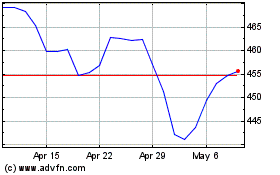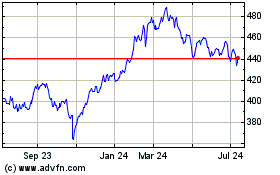U.S. Banks, Card Companies Catch a Break in China Trade Deal -- Update
January 15 2020 - 10:50PM
Dow Jones News
By David Benoit, AnnaMaria Andriotis and Tim Puko
A trade deal with China has given U.S. banks and financial
companies new hope that their decadeslong attempts to crack the
Chinese market may bear fruit.
The deal signed Wednesday clears some of the obstacles that have
prevented U.S. banks, credit-card networks, insurance companies and
investors from doing business in China.
U.S. financial institutions have long talked up the prospect of
China, where earning even a small share of the massive market could
result in sizable gains. But they have struggled to navigate the
bureaucratic thicket to obtain the licenses they need to operate
there.
JPMorgan Chase & Co., the largest U.S. bank by assets, is
waiting on the Chinese government to grant it some of the licenses
it needs to build up its investment banking and wealth-management
divisions in China. Visa Inc. and Mastercard Inc., too, need the
government's stamp of approval to get their cards more widely
accepted in China.
While short on details, the deal broadly requires China to take
action on those applications. In some cases, it sets parameters on
what the Chinese government can consider in making licensing
decisions. It also gives U.S. distressed-debt investors more access
to the Chinese market, allowing them to buy troubled loans from
China's state-owned banks.
Visa and Mastercard, in particular, stand to gain. Their
applications to operate in the country have languished. The
agreement requires China to make a decision on their applications
and to provide a reason if it rejects them.
Mastercard is making "every effort to secure the requisite
license to be able to operate in China domestically," a company
spokesman said. "This deal is a step forward in the process."
"We see significant potential for Visa to support the continued
growth and evolution of digital payments in China," said a
spokesman for Visa.
U.S. credit-card companies have won cases against China before
the World Trade Organization, but China's efforts to comply with
the rulings resulted in a permitting process nearly two decades
long.
U.S. Trade Representative Robert Lighthizer, President Trump's
lead negotiator with China, called out the lengthy process in a
February report to Congress. He said China's treatment of U.S.
credit-card companies was a "conspicuous ongoing example" of its
failure to honor WTO obligations in a bid to protect UnionPay,
China's domestic card network.
Mr. Lighthizer's comments gave heart to industry lobbyists who
had pressed their case for years. But it wasn't until Tuesday that
they got word a resolution might be part of the trade
agreement.
"We will pop the champagne when a U.S. company -- an electronic
payment company's application is approved and they start operation
in China," said Scott Talbott, senior vice president of government
affairs at the Electronic Transactions Association. "We will cross
the finish line at that point."
U.S. financial companies face a number of challenges to gaining
meaningful market share in China.
China's state-owned banks dwarf U.S. banks in size, and many
Chinese consumers pay for goods and services using mobile wallets
WeChat Pay and Alipay that don't rely on traditional card
technology.
Even if China grants licenses, more hurdles await.
In 2018, American Express Co. became the first U.S. card network
to gain approval to set up card-clearing services in China. Its
joint venture with a Chinese financial-technology firm is seeking
approval for a business operating license. The People's Bank of
China has advised AmEx that it has formally received its
application, a move AmEx saw as an important step in the
process.
China already has been taking steps to open up to foreign banks
in an effort to expand and reform its own markets. The government,
for example, has allowed them to take control of joint ventures
with domestic partners.
"They want JPMorgan to be there to help set transparency and
standards and rules," JPMorgan Chief Executive James Dimon told Fox
Business in an interview this week. "And the Chinese need, they
want to, eliminate corruption, have efficient companies and capital
allocation, and they need very good financial markets."
At a press conference announcing the deal Wednesday, President
Trump told JPMorgan executives in attendance to say hello to Mr.
Dimon for him.
Write to David Benoit at david.benoit@wsj.com, AnnaMaria
Andriotis at annamaria.andriotis@wsj.com and Tim Puko at
Tim.Puko@wsj.com
(END) Dow Jones Newswires
January 15, 2020 22:35 ET (03:35 GMT)
Copyright (c) 2020 Dow Jones & Company, Inc.
MasterCard (NYSE:MA)
Historical Stock Chart
From Mar 2024 to Apr 2024

MasterCard (NYSE:MA)
Historical Stock Chart
From Apr 2023 to Apr 2024
